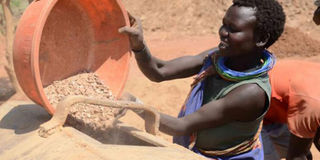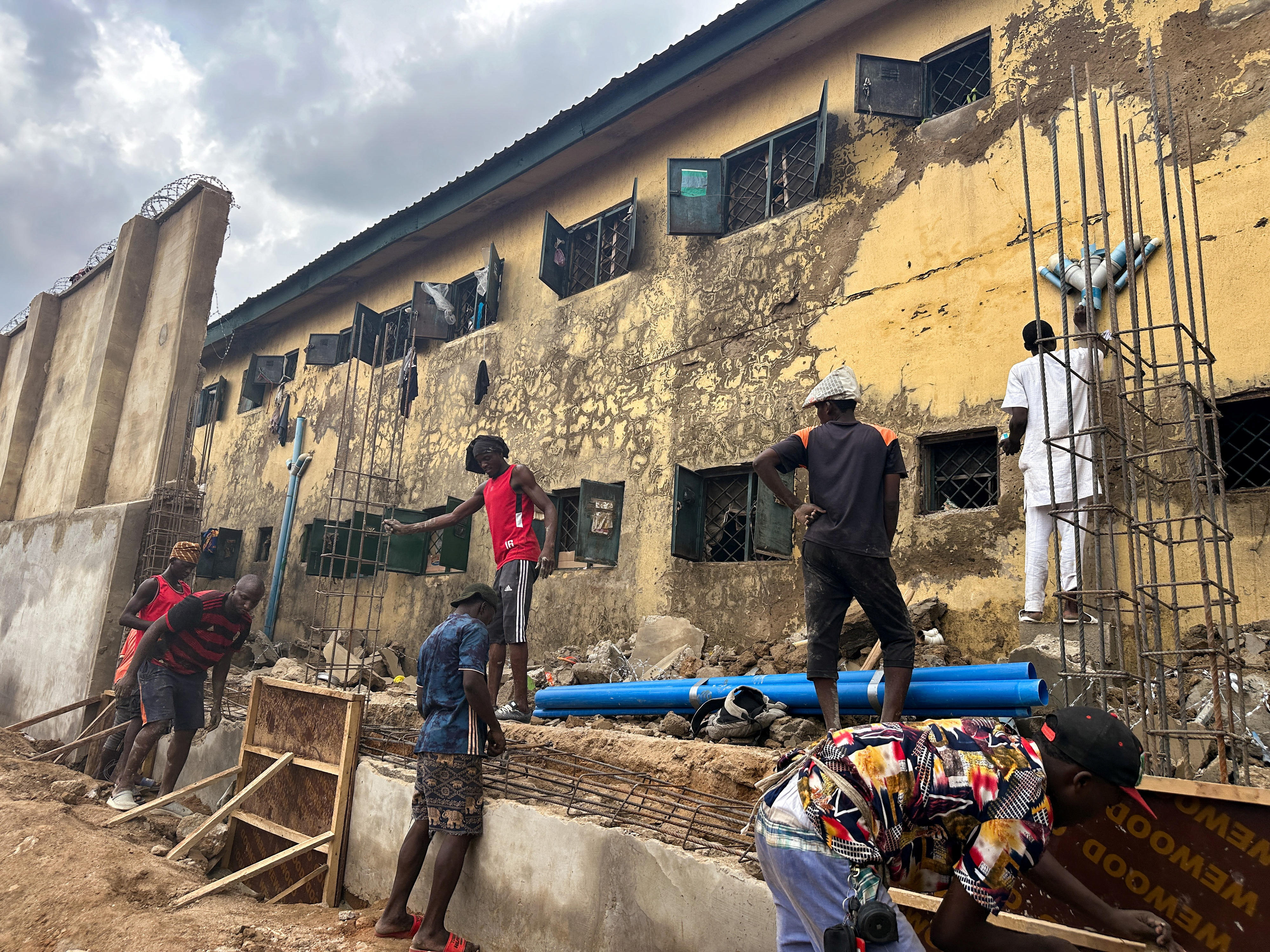DGF suspension cripples NGO activities

Mining in Karamoja Sub-region is one of the activities that was recently affected by the suspension of DGF funds. PHOTO/ COURTESY
Several non-governmental organisations (NGOs) across the country have halted or downscaled activities weeks after the government suspended operations of the Democratic Governance Facility (DGF).
A number have temporarily stopped staff from working while others have introduced a shift model for employees to reduce costs.
The most affected civil society organisation (CSOs) include those engaged in accountability, human rights and good governance, democracy, service delivery monitoring and capacity-building at national, regional and grassroots level.
Finance minister Matia Kasaija froze DGF operations on February 17 on orders of President Museveni, who on February 2, argued that more than Shs500b donor-bankrolled kitty required government oversight.
Our investigations show that some CSOs, which are beneficiaries of DGF grants, have temporarily sent staff on leave pending resumption of DGF funding.
Eight of Uganda’s development partners; Austria, Denmark, Ireland, the Netherlands, Norway, Sweden, the United Kingdom and the European Union, established DGF in July 2011 as a governance programme intended to “provide harmonised, coherent and well-coordinated support to state and non-state entities to strengthen democratisation, protect human rights”, information on DGF website reads.
The fund also aims at improving access to justice and enhance accountability in Uganda to achieve an “equitable growth, poverty eradication, rule of law and long-term stability in Uganda”.
Contention
However, President Museveni said the fund was exclusively foreign managed, adding that its activities in Uganda were calculated to “subvert” the government to achieve the political objectives of the external contributors.
The directive to suspend the fund was not implemented for two weeks before Mr Kasaija caved in to pressure and wrote to freeze DGF operations.
From NGOs in Kampala to those in the country’s remote corners, Mr Kasaija’s order continues to bite across gender, age and economic groups.
In Teso Sub-region, DGF offers grants to three CSOs; Amuria Development Agency (ADA), Teso Religious Leaders Effort for Peace & Reconciliation (TERELEPAR) and Teso Anti-Corruption Coalition (TAC).
Mr Nathan Ebiru, the director of ADA, said they halted field work due to finance issues.
The NGO conducts operations in areas of good governance and service delivery monitoring in Amuria, Bukedea, Kumi, and Katakwi districts, among others.
“We are optimistic operations will resume soon,” Mr Ebiru said.
There is no certainty when the cash will be unlocked. An ad hoc committee chaired by Prime Minister Ruhakana Rugunda, and comprising government officials and representatives of donor countries contributing to DGF, held back-to-back meetings to resolve outstanding issues.
The committee was constituted following President Museveni’s February 18 meeting with diplomats from European states led by the European Union (EU) head of Delegation, Mr Attilio Pacifici.
Mr Paul Okiring, the executive director of TAC, said all assignments/activities have been suspended, adding that they are currently working in shifts.
The NGO, which has 49 affiliate member organisations, runs activities in areas of quarterly promotional forums, monitoring of government projects, capacity building for stakeholders to monitor use of government funds in schools, local governments at district and sub-county level.
Just like ADA, Mr Okiring said TAC has scheduled its employees to work in shifts to reduce costs.
Mr Robert Kakuru, the executive director of Kick Corruption Out of Uganda, a CSO operating in Kigezi Sub-region, told this newspaper that suspension of DGF grants has hamstrung execution of their planned activities and programmes.
“We have been receiving sub-grants from four NGOs that were receiving direct grants from DGF. Ever since the DGF grants were suspended in Uganda, our activities are on standstill,” Mr Kakuru added.
The affected activities, Mr Kakuru noted, include public accountability promotion fora, accountability reflection meetings, media engagement, monitoring public contracts using access to information forms, interface with local leaders.
He appealed to the government to harmonise work relations with donors because Ugandans need the DGF grants for sustainable development.
“The fact that the government of Uganda supervises all the activities of all NGOs in the country [through the National NGO Bureau] whose work plans are readily available, it should deal with any organisation suspected of committing any offence rather than suspending the entire programme in the country,” he added.
Mr Simon Nangiro, the chairperson of Karamoja Civil Society Organisation, said the planned activities in the sub-region have stalled due to suspension of DGF.
He said the CSOs have been empowering the mining communities in Karamoja, among other activities .
Mr Francis Kiyonga, the Amudat District chairperson, said similar training of local miners in his area has stalled.
“We are the most affected community by the suspension of DGF and the government needs to revisit its position [on the matter],” he said.
Mr Apollo Lee Caking, the director of Western Ankole Civil Society Forum in Bushenyi District, said their activities of helping local councils on budget monitoring and review of campaigns against domestic violence are in limbo because there is no money.
“The problem started earlier than what we saw last month,” he said.
Mr Caking said the suspension has also affected grassroots communities.
He said a meeting that had been planned for last month with stakeholders from western region was cancelled, after getting notification from the DGF that all activities were suspended, but we had to pay for accommodation, transport refund and meals for the hotel.
“In the last elections, we received a grant of Shs176m, and part of that money cannot be got because of the suspension,” Mr Caking said.
“Our fear is [that] without funds, [the]element of shoddy work throughout government projects will thrive because our monitoring activities have been grounded,” he added.
Rwenzori Anti-Corruption Coalition (RAC), an NGO operating in nine districts and Fort Portal City, too has frozen its financial accountability and field monitoring activities.
Ms Angella Byangwa, the executive director of RAC, said she fears that with civil society members missing in the field due to cash problems, cases of corruption could increase since no one will be available to investigate or verify reported cases of graft.
The affected districts in the Rwenzori include Kabarole, Kasese, Bundibugyo, Bunyangabu, Kyenjojo, Kamwenge, Kitagwenda, Ntoroko and Kyegegwa.
The RAC activities aim to empower citizens to fight corruption and wastage of public resources.
Dr Peter Mwesige, the executive director of the African Centre for Me-dia Excellence (ACME), said the organisation will be adversely impacted if suspension of DGF operations is prolonged.
“But we don’t do all our programmes because of DGF, we have our own long-term programme of promoting journalism in Africa. This one will go on, but where some projects need resources in the long run, there might be some challenge but it won’t take long,” he said.
The NGO’s goal is to “make the media a more effective platform for the provision of information on public affairs, a tool for monitoring official power, and a forum for vibrant public debate … [through] a unique approach to continuing training and education”, information on its website reads.
Food Rights Alliance (FRA), which is among those funded by DGF, promotes the realisation of the right to food in Uganda through advocacy, knowledge management and capacity development.
Uncertainty
Ms Agnes Kirabo, the executive director of FRA, said they suspended their activities on the advice of DFG for a fortnight, which lapsed on March 7, and they are awaiting further directions.
Following the February 18 meeting between President Museveni and EU diplomats, an ad hoc team headed by Dr Rugunda was constituted to thrash out concerns and outstanding issues regarding DGF operations.
The team within the two weeks it was given recommended a raft of measures, among them inclusion of government representation in management of the Fund.
It remains unclear how long it will take to strike a consensus between the two sides or how long the required reforms will take, leaving an uncertain future for DGF grantees, their staff and grassroots beneficiaries of the activities of the affected CSOs.
In the western region, Kabarole Research and Resource Center (KRC), DGF recipient, implements projects in research, income generation, human rights promotion, peace and conflict resolution, livelihood and education, among other programmes.
Its current programme, enhancing people power for transformative leadership, which is being implemented in eight districts, is at a risk, Mr Mohammed Shariff, the KRC executive director, said.
LIST OF AFFECTED NGOs
ActionAid International-Uganda
Advocates Coalition for Development and Environment
African Center for Media Excellence
Africa Freedom of Information Centre
African Centre for Energy and Mineral Policy
African Centre for Trade and Development
African Centre for Treatment & Rehabilitation of Torture Victims
African Leadership Institute
African Youth Initiative Network
Akina Mama wa Afrika
Alliance for Finance Monitoring
AMICAALL
Amuria District Development Agency
Anti-Corruption Coalition Uganda
Center for Governance and Economic Devt
Centre for Basic Research
Centre for Women in Governance
Civil Society Budget Advocacy Group
Community Driven Network Uganda
Community Integrated Devt Initiative
Ecological Christian Organisation
Food Rights Alliance
Global Rights Alert
Gulu Women Eco. Devt and Globalisation
Human Rights Network for Journalists-Uganda
Initiative for Social and Economic Rights
International Center for Transitional Justice
Justice Defenders
Kabarole Research & Resource Centre
Kapchorwa CSO Alliance
Kind Initiative for Development
Kituo Cha Katiba: Eastern Africa Centre for Constitutional Development
Legal Aid Service Providers Network
Maendeleo ya Jamii
Muslim Centre for Justice Law
National Coalition for Human Rights Defenders Uganda
Netherlands Institute for Multiparty Democracy Uganda
Penal Reform International
Platform for Labour Action
Restless Development Uganda
Rwenzori Anti-Corruption Coalition
Rwenzori Forum for Peace and Justice
Teso Anti-Corruption Coalition
Teso Religious Leaders Efforts for Peace and Reconciliation
The Apac Anti-Corruption Coalition
The Human Rights Centre Uganda
The Women’s International Peace Centre
Transparency International Uganda
Uganda Association of Women Lawyers
Uganda Debt Network
Uganda Joint Christian Council
Uganda Media Women’s Association
Uganda National NGO Forum
Uganda Project Implementation & Management Centre
Uganda Radio Network
Uganda Women’s Network
Westminister Foundation For Democracy
Wizarts Foundation
World Voices Uganda
Compiled By Simon Peter Emwamu, Robert Muhereza, Naume Biira, Ste-ven Ariong, Milton Bandiho & Felix Basiime




